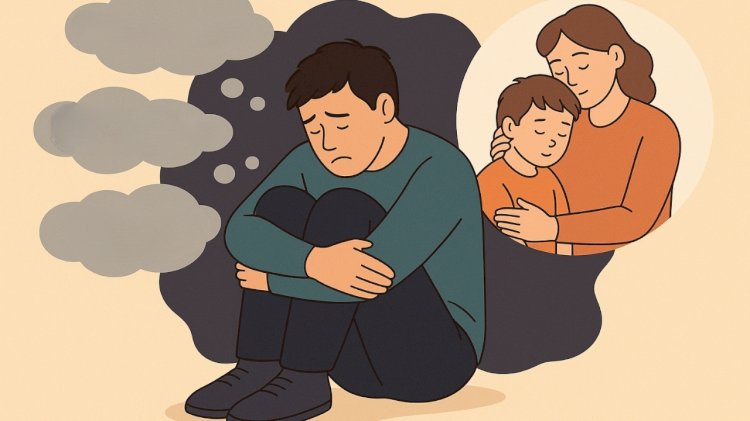Why Do I Keep Repeating the Same Patterns? – Childhood Emotional Neglect and Adult Relationships

Every person needs to feel emotionally safe during the early years of life, to learn what it means to be loved, and to develop trust. For this to happen, a certain level of emotional attention, warmth, and consistency must be received from caregivers. When these fundamental needs are unmet, various psychological, emotional, and social problems may arise in adulthood.
Adults who did not receive enough love and emotional support as children often unconsciously try to fill the emotional void left by their childhood experiences. This article explores the main challenges these individuals face — such as attachment styles, low self-esteem, feelings of loneliness, indecisiveness, fear of intimacy, and the constant search for validation. We will also discuss personal development strategies that can help overcome these patterns.
1. Difficulties in Forming Emotional Bonds
Adults who did not receive sufficient emotional support in childhood often struggle with forming healthy relationships. Inconsistent or cold responses from parents prevent the child from seeing the world as a safe place. As a result, in adulthood, these individuals often develop either an avoidant or anxious (preoccupied) attachment style.
- Avoidant Attachment : People with this attachment style tend to avoid close relationships, avoid sharing emotions, and strive to appear independent — yet they internally experience deep loneliness.
- Anxious Attachment : On the other hand, people with this style constantly seek reassurance from their partners, become overly dependent, and react sensitively to criticism. To them, being loved is everything, but they never feel good enough.
These attachment styles can cause serious issues in romantic relationships, friendships, and even professional relationships. Individuals often find themselves stuck in push-pull dynamics — pushing people away out of fear or clinging to them out of desperation — which leads to short-lived relationships or constant conflicts.
2. Low Self-Esteem and Lack of Confidence
Children who don’t receive parental love, appreciation, or approval often grow up without learning to see themselves as valuable. Since the child’s brain is highly sensitive to external feedback, negative reactions or indifference from parents create harmful beliefs about the self. For example:
- “I’m not good enough.”
- “I don’t get along well with anyone.”
- “I always say or do the wrong things.”
- “No one would stay with the real me.”
These beliefs persist into adulthood on a subconscious level, creating a feeling of inner emptiness — no matter how successful the person becomes. Success might be visible externally, but internal satisfaction remains absent. These individuals constantly seek external validation because the message they received in childhood was: “You are only as valuable as what you do.” Therefore, they fear making mistakes, have difficulty accepting criticism, and often adopt perfectionist tendencies.
3. Fear of Intimacy and Trust Issues
Fear of closeness is one of the deepest traumas experienced by individuals who were unable to learn trust in childhood. Forming a real connection, opening up, and lowering one's defenses can feel dangerous. If vulnerability was punished or ignored in the past, the adult mind fears repeating that pain.
Some adults run away when a relationship starts to deepen because true intimacy can awaken old wounds. The inner voice says, “Eventually, you’ll be abandoned,” or “You’ll just get hurt again.” That’s why some people intentionally keep distance in relationships, or constantly test others to receive reassurance — behaviors that ultimately lead to relationship breakdowns.
4. Inner Emptiness and the Search for Constant Fulfillment
Adults who grew up with emotional neglect often carry a sense of inner emptiness . This void is frequently filled with temporary distractions — material success, money, sex, alcohol, shopping, or overworking. However, these methods offer only short-term relief. Real healing comes from addressing the root of the emptiness.
These individuals often try to keep themselves busy because when they are still, they feel the silence, loneliness, and pain more intensely. Some exhaust themselves by jumping into new projects; others live consumer-driven lives. But none of these provide lasting happiness — only exhaustion.
5. Difficulty Taking Responsibility and Adapting to the Role of Adulthood
Children raised in families where parental roles were not modeled healthily may struggle with adult responsibilities later in life. Without proper role models, they may either take on too much responsibility too early (parentified children) or completely avoid it.
Some remain overly dependent on others, while others insist on doing everything alone but end up burned out from taking on every responsibility offered. Deep internal conflicts around independence and asking for help are common in these individuals.
6. Overreaction to Criticism and Distrust in Relationships
Adults who respond defensively or feel guilty easily in response to criticism often have a history of being criticized or belittled in childhood. For them, any small critique feels like rejection or a sign of losing value.
This creates ongoing tension in workplaces, families, and personal relationships. They remain in a constant state of defense, misinterpret others’ intentions, and communication breaks down.
7. Tendency to Blame Oneself and Loss of Control
Adults who lacked love and safety in childhood often believe everything is their fault. They interpret every negative event in life as a reflection of their worth. This mindset contributes significantly to depressive thoughts.
Alternatively, some individuals react in the opposite way — trying to control everything. Because they experienced chaos and lack of control in childhood, they believe everything must be under control in adulthood. This leads to increased stress and anxiety.
How Can One Break Free From This Pattern?
Living with these traumatic experiences is difficult, but through a process of personal growth and healing, these wounds can be repaired. The following steps can help initiate and continue this journey:
1. Self-Awareness and Understanding
The first step is recognizing your emotional and behavioral patterns. Ask yourself why you constantly feel lonely, why you struggle to form close bonds, or why you always seek validation. Be kind and compassionate toward yourself — these patterns were once survival mechanisms that helped you cope, but they may no longer serve you.
2. Seek Therapy
Professional support is one of the most effective ways to heal from these emotional wounds. Trauma-informed therapies — such as EMDR, CBT, Gestalt, or Psychodynamic Therapy — offer powerful tools for processing childhood trauma. Talking about your past in a safe space with a therapist, expressing your emotions, and learning new perspectives can change your life.
3. Practice Self-Compassion
Compassion isn't just something we give to others — it should also be directed inward. Learn to be gentle with yourself, forgive your mistakes, and view failures as opportunities to grow. Becoming your own inner parent means giving yourself the love that was missing in childhood.
4. Build Healthy Relationships
Healthy relationships are among the strongest tools for relearning trust. Of course, this process takes time and requires courage. But over time, it's possible to meet people who accept you as you are and whom you can trust. The key is to stop expecting everyone to leave and start objectively evaluating your experiences.
5. Increase Emotional Awareness
Learning to identify, name, and express your emotions helps you understand your inner world better. Practices like meditation, journaling, and breathing exercises can increase emotional awareness and improve self-regulation.
6. Set Boundaries
Some adults struggled with boundary violations in childhood, so they have difficulty setting boundaries in adulthood. Learning to say “no,” stand up for yourself, and not take on others’ emotional burdens is essential for developing a healthy sense of self.
Conclusion
Not receiving enough parental love in childhood leaves deep marks on many areas of life. But these marks do not define you or limit you permanently. They are simply healed or unhealed wounds — and healing is possible.
Personal growth is a transformative journey. During this process, patience, kindness, and giving yourself time are essential. Your past shapes you, but it does not determine your future. True freedom comes from providing yourself with the love and care that was missing in childhood.
Remember: You deserve to be loved — and you equally deserve to love yourself. And when you begin to give that love to yourself first, the world begins to look different.
En güncel gelişmelerden hemen haberdar olmak için Telegram kanalımıza katılın!






















